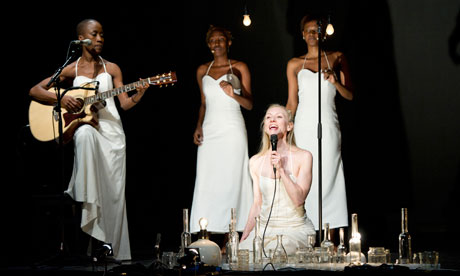
This is Shakespeare reimagined from the viewpoint of one of his great tragic heroines, but now with an audaciously new setting, the afterworld, and an African perspective. The stage is in half-darkness and littered with glass, like an African graveyard, and the performers are dressed in white, with their shadows looming on a screen behind the stage. Desdemona, powerfully and sensitively played by Tina Benko, is able to discuss in death the issues she never raises before her murder in Shakespeare's Othello, and the woman to whom she unburdens her thoughts is her mother's African maid Barbary, intensely played by the Malian singer Rokia Traoré, who also sings a set of compelling songs, interwoven with the spoken narratives.
Written by Toni Morrison and directed by Peter Sellars, this multimedia project was inspired by the fourth act of Othello, in which Desdemona, facing death, sings Willow Song, taught to her by Barbary. It's a device that allows an exploration of Desdemona's fascination with Africa, for monologues on women, love, race, relationships and war, for discussions in the afterlife with Othello himself, and between the mothers of Othello and Desdemona – with Benko providing all the voices.
Traoré's songs (with lyrics translated on the screen) are crucial to the drama. She has enjoyed a remarkable summer, performing three sets of wildly different new material in the past month, and the new songs reflected her acoustic Epic of Soundiata, with reminders of how Desdemona's story might have been told in Africa in Shakespeare's day.
As on that project, backing was provided by Mamadyba Camara on kora and Mamah Diabaté on n'goni, along with two singers from her Fondation Passerelle. Her music, of course, included a new treatment of Willow Song, along with a blues-influenced piece on which Traoré played guitar, leading to the final uneasy reconciliation between Desdemona and Othello in the afterlife. This is a remarkable, challenging and bravely original work.

